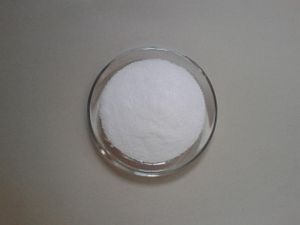Monopotassium phosphate
 MKP from a pet shop.
| |
| Names | |
|---|---|
| IUPAC name
Potassium dihydrogen phosphate
| |
| Other names
Potassium phosphate monobasic
KDP | |
| Identifiers | |
| Jmol-3D images | Image |
| |
| Properties | |
| KH2PO4 | |
| Molar mass | 136.086 g/mol |
| Appearance | White crystalline powder |
| Odor | Odorless |
| Density | 2.338 g/cm3 |
| Melting point | 252.6 °C (486.7 °F; 525.8 K) |
| Boiling point | 400 °C (752 °F; 673 K) (decomposes) |
| 22.6 g/100 mL (20 °C) 83.5 g/100 mL (90 °C) | |
| Solubility | Slightly soluble in ethanol, methanol Insoluble in benzene, dichloromethane |
| Acidity (pKa) | 6.86 |
| Hazards | |
| Safety data sheet | ScienceLab |
| Flash point | Non-flammable |
| Related compounds | |
| Related compounds
|
Dipotassium phosphate Tripotassium phosphate |
| Except where otherwise noted, data are given for materials in their standard state (at 25 °C [77 °F], 100 kPa). | |
| Infobox references | |
Monopotassium phosphate (MKP) or potassium dihydrogen phosphate (KDP) is a soluble phosphoric acid salt of potassium with the chemical formula KH2PO4.
Contents
Properties
Chemical
Monopotassium phosphate is commonly used as a buffer with a pKa of 6.86, and will react with both acids and bases in solution. Reacting MKP with 1 mole of potassium hydroxide will produce dipotassium phosphate, and further adding phosphoric acid will convert it to tripotassium phosphate:
- KH2PO4 + KOH → K2HPO4 + H2O
- K2HPO4 + KOH → K3PO4 + H2O
Using potassium carbonate for the same reaction stops at dipotassium phosphate due to the lower pKa of potassium carbonate.
Physical
Potassium dihydrogen phosphate is a white solid, soluble in water. It decomposes when heated above 400 °C. MPK's density is 2.338 g/cm3 at standard conditions.
Availability
MKP is sold in some agricultural stores as fertilizer. Hydroponics stores and companies sell it as a water-soluble nutrient.
It can also be purchased from some pet stores for use in household aquariums.
Preparation
Potassium dihydrogen phosphate can be made by the partial neutralization of phosphoric acid with potassium hydroxide or potassium carbonate. Excess phosphoric acid is recommended as it will limit the generation of any monohydrogen phosphate species. It can easily be crystallized from solution due to its lower solubility at ambient temperatures.
Projects
- Grow large crystals
- Make elemental phosphorus
- pH buffer
Handling
Safety
MPK is safe to handle and poses little toxicity.
Storage
MKP is highly stable with time and doesn't require any particular storage conditions.
Disposal
MKP is nontoxic and safe to dispose of down a drain or in normal household waste.
References
Relevant Sciencemadness threads
- Chemical pages without CAS Registry Number
- Articles without EBI source
- Chemical pages without ChemSpiderID
- Chemical pages without DrugBank identifier
- Articles without KEGG source
- Articles without InChI source
- Articles without UNII source
- Articles containing unverified chemical infoboxes
- Chemical compounds
- Inorganic compounds
- Potassium compounds
- Phosphates
- Readily available chemicals